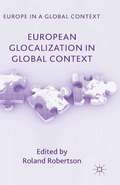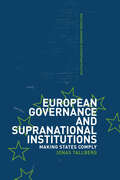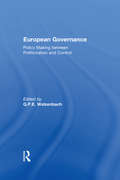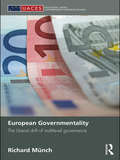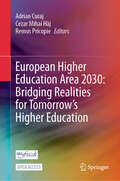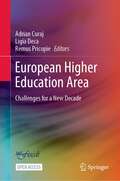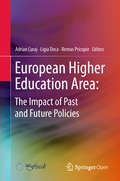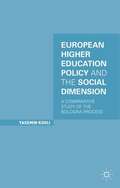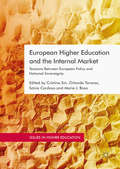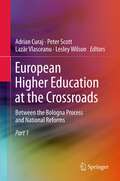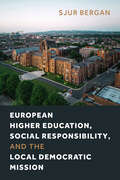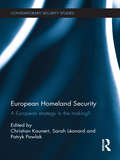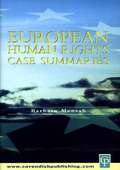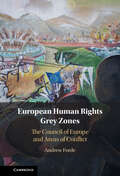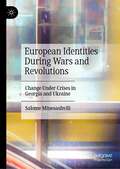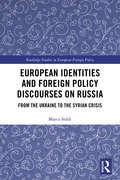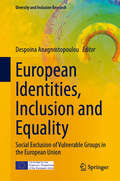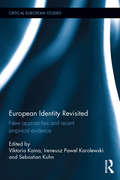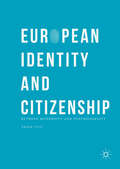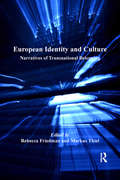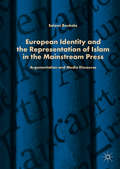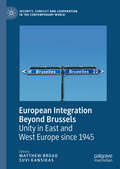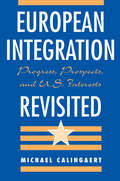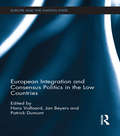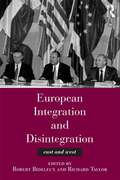- Table View
- List View
European Glocalization in Global Context (Europe in a Global Context)
by Roland RobertsonThis book consists of a collection of essays that deal with glocalization in Europe, including the idea of Europeanization as glocalization. The contributors deal with a range of topics including migration, media, football, beauty, Christianity, democracy and the European Union.
European Governance and Supranational Institutions: Making States Comply (Routledge Advances in European Politics #Vol. 14)
by Jonas TallbergThis book examines the influence of the European Commission and the European Court of Justice in the political and legal enforcement of member state compliance in the EU. The authors show how the EU's supranational institutions have played an independent role in the creation of a European enforcement system that is exceptionally effective compared to that of other international organizations.
European Governance: Policy Making between Politicization and Control
by G. P. E. WalzenbachThis collection provides a balanced evaluation of multi-level governance. Written by international experts of policy-making in the European Union, each contribution builds on common conceptual definitions, critically debating their adaptation to policy-specific contexts and investigating their usefulness for conducting empirical research. This engaging text uses case studies to identify the specific changes that have occurred in power relations across different levels of the EU system. With varying emphasis on state and non-state actors, on country comparisons and international processes, the reader is invited to join a fruitful dialogue among the contributors about the symbiotic relationship of multi-level analysis with other conceptual innovations such as transnational regulation, network formation or market internationalization. This book confronts sophisticated theoretical reasoning with the actual realities of policy-making and is therefore essential reading for all those interested in the risks and opportunities of a comparative-interdisciplinary approach to European governance.
European Governmentality: The Liberal Drift of Multilevel Governance (Routledge/UACES Contemporary European Studies)
by Richard MünchThis book contributes to the literature on the change of governance in the context of its European multilevel organization. The integration of Europe is a process of fundamental social change: a process of constructing a European society and of deconstructing the national societies. Münch demonstrates that there is a movement away from republican and representative features of a democracy and towards liberal and pluralistic features. The book illustrates this change in the nature of European political regulation, European jurisdiction and the intellectual debates in France, Germany and Britain on legitimising the emerging system of multilevel governance. He discusses how far the new European regime of liberal governmentality converges with the US-American type of constitutional liberalism. Following a sociological approach, the book focuses on identifying the causes, features and consequences of the fundamental social change taking place in the process of European integration. This book will be of interest to scholars and graduate students from political science, sociology, law and philosophy interested in political theory, comparative politics, international relations and political communication as well as practitioners of policy-making in governments, administration, parties, associations and the media.
European Higher Education Area 2030: Bridging Realities for Tomorrow’s Higher Education
by Adrian Curaj Remus Pricopie Cezar Mihai HâjThis open access book presents the major outcomes of the fifth edition of the Future of Higher Education – Bologna Process Researchers’ Conference (FOHE-BPRC5), organized by the Executive Agency for Higher Education, Research, Development and Innovation Funding (UEFISCDI) prior to the 2024 Ministerial Conference in Tirana. The Conference is considered a landmark in the European Higher Education Area, encouraging dialogue between researchers and policy-makers. The resulting book provides a forward-looking perspective on how the EHEA is evolving in response to current challenges and opportunities, by focusing on topics such as internationalization, equity and employability, fundamental values, impact of digitalization or innovative learning and teaching. The papers presented offer insights in these areas, illustrating successful or failed implementations within the EHEA and are published in open access format to ensure that the researchers’ perspectives are widely available to European policy and decision makers. Since 2024 marks the first post pandemic edition of the Conference, it is a good moment to not only to take stock of the challenges brought by the Covid-19 pandemic and the war in Ukraine, but also to explore how scientific research can support policy into shaping the directions for the future to come.
European Higher Education Area: Challenges For A New Decade
by Adrian Curaj Ligia Deca Remus PricopieThis open access book presents the major outcomes of the fourth edition of the Future of Higher Education – Bologna Process Researchers Conference (FOHE-BPRC 4) which was held in January 2020 and which has already established itself as a landmark in the European higher education environment. The conference is part of the official calendar of the European Higher Education Area (EHEA) for events that promote and sustain the development of EHEA. The conference provides a unique forum for dialogue between researchers, experts and policy makers in the field of higher education, all of which is documented in this proceedings volume. The book focuses on the following five sub-themes: - Furthering the Internationalization of Higher Education: Particular - Challenges in the EHEA - Access and Success for Every Learner in Higher Education - Advancing Learning and Teaching in the EHEA: Innovation and Links With Research - The Future of the EHEA - Principles, Challenges and Ways Forward - Bologna Process in the Global Higher Education Arena. Going Digital? While acknowledging the efforts and achievements so far at EHEA level, the Paris Ministerial Communiqué highlights the need to intensify crossdisciplinary and cross-border cooperation. One of the ways to achieve this objective is to develop more efficient peer-learning activities, involving policymakers and other stakeholders from as many member states as possible for which this book provides a platform. It acknowledges the importance of a continued dialogue between researchers and decisionmakers and benefits from the experience already acquired, this way enabling the higher education community to bring its input into the 2020. European Higher Education Area (EHEA) priorities for 2020 onwards. European Higher Education Area: Challenges for a New Decade marks 21 years of Bologna Process and 10 years of EHEA and brings together an unique collection of contributions that not only reflect on all that has been achieved in these years, but more importantly, shape directions for the future. This book is published under an open access CC BY license.
European Higher Education Area: The Impact of Past and Future Policies
by Adrian Curaj Ligia Deca Remus PricopieThis volume presents the major outcomes of the third edition of the Future of Higher Education – Bologna Process Researchers Conference (FOHE-BPRC 3) which was held on 27-29 November 2017. It acknowledges the importance of a continued dialogue between researchers and decision-makers and benefits from the experience already acquired, this way enabling the higher education community to bring its input into the 2018-2020 European Higher Education Area (EHEA) priorities. The Future of Higher Education – Bologna Process Researchers Conference (FOHE-BPRC) has already established itself as a landmark in the European higher education environment. The two previous editions (17-19 October 2011, 24-26 November 2014), with approximately 200 European and international participants each, covering more than 50 countries each, were organized prior to the Ministerial Conferences, thus encouraging a consistent dialogue between researchers and policy makers. The main conclusions of the FOHE Conferences were presented at the EHEA Ministerial Conferences (2012 and 2015), in order to make the voice of researchers better heard by European policy and decision makers. This volume is dedicated to continuing the collection of evidence and research-based policymaking and further narrowing the gap between policy and research within the EHEA and broader global contexts. It aims to identify the research areas that require more attention prior to the anniversary 2020 EHEA Ministerial Conference, with an emphasis on the new issues on rise in the academic and educational community. This book gives a platform for discussion on key issues between researchers, various direct higher education actors, decision-makers, and the wider public. This book is published under an open access CC BY license.
European Higher Education Policy and the Social Dimension
by Yasemin KooijThe Bologna Process has significantly shaped recent higher education policies across Europe, but the area of the social dimension has so far been neglected. Drawing on a cross-country case study (Finland, Germany and Turkey), this book examines the major Bologna reforms, in particular the social dimension, and whether this aspect has successfully been incorporated into policy. Discussing key themes, actors, goals, policies and agendas and setting out recommendations, this book examines the social dimension as a component of the Bologna Process.
European Higher Education and the Internal Market: Tensions Between European Policy and National Sovereignty (Issues in Higher Education)
by Orlanda Tavares Cristina Sin Sónia Cardoso Maria J. RosaThis book analyses European higher education policies and their three main drivers: the European Commission, the European Court of Justice and the building of the European Higher Education Area through the Bologna Process. Central to the volume is the issue of European institutions’ intervention in higher education: building a common area for higher education in a domain protected by subsidiarity is no easy task, and one that must consider the supra-national, national and institutional levels that all play a role in policy implementation. In this volume, the editors and contributors navigate within the tensions between the establishment of an internal market on the one hand and national sovereignty on the other. This volume will surely be of interest and value to those studying and working in the area of higher education policy and understanding relationships between European institutions and member states.
European Higher Education at the Crossroads
by Peter Scott Adrian Curaj Lesley Wilson Lazăr VlasceanuRomania hosts the 2012 Bologna / European Higher Education Area Ministerial Conference and the Third Bologna Policy Forum. In preparation for these meetings, The Executive Agency for Higher Education, Research, Development and Innovation Funding (UEFISCDI) organised the Future of Higher Education - Bologna Process Researchers' Conference (FOHE-BPRC) in Bucharest on 17-19 October 2011, with the support of the European University Association (EUA) and the Romanian National Committee for UNESCO. The conference brought the voices of researchers into international-level policy making in higher education. The results of the conference are presented in this book. Until now, empirical evidence supporting policies and reforms in higher education has often been a matter of local or regional focus. The development of a pan-European process in higher education policy drives a need to explore wider research topics on which to base policies. This book offers an unprecedented opportunity for higher education researchers to interact and contribute to the political process shaping the European Higher Education Area (EHEA), and to national policy agendas in more than 100 participant countries for the 2012 ministerial events. The book collects more than 50 articles focusing on vital issues in European higher education. These are arranged in sections addressing the European Higher Education Area (EHEA) Principles; Teaching and Learning; Quality Assurance; Mobility; Higher Education Governance in the EHEA; Funding of Higher Education; Diversification of Higher Education Missions; Higher Education Futures and Foresight.
European Higher Education, Social Responsibility, and the Local Democratic Mission (Higher Education, Place, and Social Responsibility)
by Sjur BerganEducation is about more than preparing students for the labor market; it is about preparing them to be active citizens in democratic societies, to engage in personal growth, and to develop a broad, advanced knowledge base. As Sjur Bergan emphasizes in European Higher Education, Social Responsibility, and the Local Democratic Mission, advocacy is required to ensure that higher education institutions meet these goals through cooperation with their local communities. Bergan outlines the political and institutional complexity of European universities. He explains how history, cultural traditions, and national identities impact education across Europe. He also describes the roles of the Council of Europe and U.S. higher education in the development of a transatlantic cooperation on the democratic mission of higher education. Other chapters explore education programs for developing and maintaining democracy and human rights, pragmatic and creative ways that European universities are working with their local communities, and the development of education opportunities for refugees. Ultimately, Bergan’s book explores not only the local democratic mission of higher education as it has developed in Europe, but also how it could continue to develop, and why it is important it does so. In the series Higher Education, Place, and Social Responsibility.
European Homeland Security: A European Strategy in the Making? (Contemporary Security Studies)
by Christian Kaunert, Sarah Léonard and Patryk PawlakThis book examines the processes and factors shaping the development of homeland security policies in the European Union (EU), within the wider context of European integration. The EU functions in a complex security environment, with perceived security threats from Islamist terrorists, migration and border security issues, and environmental problems. In order to deal with these, the EU has undertaken a number of actions, including the adoption of the European Security Strategy in 2003, the Information Management Strategy of 2009, and the Internal Security Strategy of 2010. However, despite such efforts to achieve a more concerted European action in the field of security, there are still many questions to be answered about whether the European approach is really a strategic one. European Homeland Security addresses two major debates in relation to the development of homeland security in Europe. First, it reflects on the absence of ‘homeland security’ in European political debate and its potential consequences. Second, it examines the significant policy developments in the EU that suggest the influence of homeland security ideas, notably through policy transfer from the United States. The book will be of great interest to students of European security and EU politics, terrorism and counter-terrorism, security studies and IR.
European Human Rights Case Summaries
by Barbara MensahThis book can be used together with the European Human Rights Case Locator or as a stand-alone volume. This book contains all the cases decided by the court from 1960 to 2000, set out in an informative and easy to read summary form. The majority of the cases have not previously been reported in any UK law report. The cases are listed in alphabetical order and the following information is presented in each case summary: name of the case and case number (from numbering system adopted in European Human Rights Case Locator) law report reference (if it has been reported) date of application to the Commission/Court the date of the Commission report (pre-October 1998 cases) and the date of judgment brief summary of the facts of the case Commission finding (pre-October 1998 cases) Court's decision and reasons on the substantive Articles/Protocols Court's decision on just satisfaction/damages, expenses and costs all other cases cited by the court in its decision. This book also includes a list of all the cases in chronological order with numbering, a list of cases by subject matter and a copy of the relevant articles and Protocols of the European Convention on Human Rights. This book provides a complete reference source and research tool in a single volume of all the Court's judgements.
European Human Rights Grey Zones: The Council of Europe and Areas of Conflict
by Andrew FordeForde examines the effectiveness of the human rights system of the Council of Europe (CoE) in conflict-affected regions and advances a novel approach to understanding how the European Convention on Human Rights can better serve the 10+ million rights-holders living in so-called human rights 'grey zones'. Building on the premise that nowhere in Europe should be deprived of access to Europe's human rights architecture, Forde argues that areas of conflict give rise to a collective public order imperative on Member States to seek maximal effectiveness of the CoE human rights system. Despite Kosovo's sui generis status, much of the CoE's experience of engagement with Kosovo could inspire more proactive efforts in relation to other areas of conflict. This book advocates a judicious engagement of the CoE's unique assets and acquis in affected regions based on the collective responsibility of Member States and the normative will of the Secretary General.
European Identities During Wars and Revolutions: Change Under Crises in Georgia and Ukraine
by Salome MinesashviliThis book provides an up-to-date discussion of the effect of crises on European identities in the post-Soviet states. In doing so, the book presents an original study on dynamics of European identities during four crises in Georgia and Ukraine. More specifically, it considers the comparative impact of two colour revolutions and wars involving Russia on European identity constructions in Georgian and Ukrainian public identity discourses, studied through national mass media. It compares outcomes of change and continuity during such “big bang” events in identity discourses and establishes scope conditions that allow or inhibit change. The major finding of the study is that the selected events can indeed instigate sudden shifts in European identity discourses but only when the elite power structure also changes in such hybrid regimes, as Ukraine and Georgia. These changes include shifts in elite groups and in the relative power they hold in the overall power structure.
European Identities and Foreign Policy Discourses on Russia: From the Ukraine to the Syrian Crisis
by Marco SiddiThis book examines the relationship between national identity construction and current foreign policy discourses on Russia in selected European Union member states in 2014–2018. It shows that divergent national discourses on Russia derive from the different ways in which the country was constructed in national identity. The book develops an interpretive theoretical framework and argues that policy makers’ agency can profoundly influence the contestation between different identity narratives. It includes case studies in policy areas that are of primary importance for EU–Russia relations, such as energy security (the Nord Stream 2 controversy), the Ukraine crisis and Russia’s military intervention in Syria. Focusing on EU member states that have traditionally taken different stances vis-à-vis Russia (Germany, Poland and Finland), it shows that at the peak of the Ukraine crisis national discourses converged towards a pragmatic, but critical narrative. As the Ukraine crisis subsided and new events took centre stage in foreign policy discussions (i.e. the Syrian civil war, international terrorism), long-standing and identity-based divergences partly re-emerged in the discourses of policy makers. This became particularly evident during the Nord Stream 2 controversy. Deep-rooted and different perceptions of the Russian Other in EU member states are still influential and lead to divergent national agendas for foreign policy towards Russia. This book will be of interest to students and scholars working in European and EU politics, Russian and Soviet politics, and International Relations.
European Identities, Inclusion and Equality: Social Exclusion of Vulnerable Groups in the European Union (Diversity and Inclusion Research)
by Despoina AnagnostopoulouThe volume takes an interdisciplinary and intersectional approach to recent trends in European identities, social exclusion and poverty on the one hand, and social rights and equality legislation and policies in the European Union on the other. It examines whether legal instruments and policies can effectively address structural discrimination and social exclusion, explores their interplay with identity politics and stereotypes, and examines how legal principles and policies translate into societal progress and inclusion at both the EU and national levels. The book highlights the social rights safeguarded in the European Pillar of Social Rights, the EU Charter of Fundamental Rights and the Council of Europe's European Social Charter, as well as the role of EU and national courts in interpreting social rights and non-discrimination legislation. Using case studies from Greece, Italy and Spain, the book examines state and civil society initiatives to combat poverty and marginalization. The book will appeal to students, researchers and academics in political science, law, sociology and education, as well as policy-makers and practitioners interested in equality and social policies aimed at combating social exclusion, marginalization and poverty.
European Identity Revisited: New approaches and recent empirical evidence (Critical European Studies #3)
by Ireneusz Pawel Karolewski Viktoria Kaina Sebastian KuhnIt has been argued that the emergence of a European collective identity would help overcome growing disparity caused by the increasing diversity of today’s European Union, with 28 member states and more than 500 million people. Research on European integration is facing the pressing question of what holds ‘Europe’ together in times of crisis, growing distributional conflict and instability in its neighbourhood. This book departs from the ideas of group cohesion in the EU, and reflects on the newest dynamics and practices of European identity. Whilst applying innovative qualitative, quantitative and experimental research methods and an interdisciplinary approach, this volume looks at a variety of issues such as European citizenship, mobility of European citizens, space-based identities, dual identities, student identity and value-sharing. In doing so, this volume presents new perspectives on this complex and dynamic subject and points to potential solutions both in the academic discourse and the political practice of the EU. This text will be of key interest to scholars and students of European integration, European studies, international relations, citizenship studies, political sociology as well as more broadly in the social sciences.
European Identity and Citizenship
by Sanja IvicThis book uses a theoretical and empirical approach to explore the philosophies of European citizenship and European identity. The author applies a focused analytical framework to argue that European identity and citizenship should be perceived as postmodern categories which are multi-layered, dynamic and fluid. The book offers a detailed review of political and legal studies which do not comprehend or explain postmodernist concepts of citizenship and identity. In the theoretical part of the book various philosophical models of citizenship and identity (from antiquity to the postmodern era) are portrayed, and the author's own theory and analytical framework is developed. The empirical part of the book discusses a variety of case studies illustrating how European Union policies apply to this framework.
European Identity and Culture: Narratives of Transnational Belonging (Studies in Migration and Diaspora)
by Markus ThielAs the EU continues its integration process, the concepts of culture and transnational European belonging remain ambivalent, whether in the realm of socio-historical representation or mass politics. Engaging with recent scholarly debates surrounding the formation of collective transnational identities, this collection draws on the latest empirical case studies to explore the meaning and composition of European identity, the mechanisms that create and shape it and the question of whom it includes. Each author pays close attention to the cultural aspects of identity formation, whether manifested in official, institutional articulations, such as symbols, coinage, ceremonies and discursive manifestations, or in the cultures of the everyday, such as through new forms of communication networks, consumption or leisure. Exploring attempts by various actors - institutions, groups, individuals - to create transnational European identities, European Identity and Culture scrutinizes the cultural formations that have either reignited or emerged in often contradictory relations to the EU project, including local, regional and transnational allegiances. A rich, interdisciplinary investigation of the role of culture in the formation of European identity, whether as a central building block to unity or as a formidable obstacle to a common sense of purpose, this book will be of interest to scholars across the social sciences and humanities working on questions of political culture, European integration, citizenship and (trans-) national identity.
European Identity and the Representation of Islam in the Mainstream Press: Argumentation and Media Discourse
by Salomi BoukalaThis book combines media studies and linguistics with theories of national and supranational identity to offer an interdisciplinary approach to the study of European identity/ies and news discourses. Taking representations of ‘Islamist terrorism’ and Turkey’s accession to the European Union as case studies, it analyses the discursive construction of supranational European identity through the discursive distinction of ‘Us’ and ‘Them’. Moreover, it compares the media’s representations of the ‘Other’ in different socio-political moments in Europe- from times of European integration (2004-5) to the European dystopia (2015-16) through the discourse analysis of specific Greek, British and French newspapers. This timely work synthesizes classic argumentative approaches and Gramscian thought in the study of media discourses by focusing on the Aristotelian concept of topos and introducing the concept of ‘hegemonic knowledge’. This pioneering work will appeal to scholars across the fields of linguistics, social anthropology, European politics, and media studies.
European Integration Beyond Brussels: Unity in East and West Europe Since 1945 (Security, Conflict and Cooperation in the Contemporary World)
by Matthew Broad Suvi KansikasEurope is a continent whose history has, in one form or another, long been dominated by integration. And yet the European integration process is often treated as synonymous with the evolution of just one particular, and until recently geographically quite limited, Western-centred organisation: the European Union (EU). This trend obscures the multitude of ways European states have acted collectively on both sides of the Iron Curtain – and continue to do so throughout the continent today. With contributors drawn from history and political science, this book explores some of these diverse integration efforts ‘beyond Brussels’. We shine a light on international organisations, trade frameworks, and various political, social, scientific and cultural forms of unity in both Eastern and Western Europe. In so doing, the book seeks to redefine the history of the European integration process not only as a less purely EU-centric phenomenon but as a less strictly Western European one too.
European Integration Revisited: Progress, Prospects, And U.s. Interests
by Michael CalingaertIn this fresh and timely account, Michael Calingaert explores the successes and failures of European economic and political integration, analyzes the factors that will determine its future course, and outlines the directions the European Union is moving in as it approaches the 21st century. Assessing U.S. interests affected by European integration, Calingaert recommends policies for the United States to consider in the face of an increasingly consolidated Europe. With its broad coverage and readable synthesis of a wealth of detailed information, this book will be of interest to students, scholars, and policymakers alike.
European Integration and Consensus Politics in the Low Countries (Europe and the Nation State)
by Patrick Dumont Hans Vollaard Jan BeyersThe Netherlands, Belgium and Luxembourg are well-known cases of consensus politics. Decision-making in the Low Countries has been characterized by broad involvement, power sharing and making compromises. These countries were also founding member states of the European Union (EU) and its predecessors. However, the relationship between European integration and the tradition of domestic consensus politics remains unclear. In order to explore this relationship this book offers in-depth studies of a wide variety of political actors such as governments, parliaments, political parties, courts, ministries and interest groups as well as key policy issues such as the ratification of EU treaties and migration policy. The authors focus not only on Europeanization, but also analyse whether European integration may gradually undermine the fundamental characteristics of consensus politics in the Low Countries. Drawing on consociationalism and Europeanization research, this volume provides a comprehensive overview of Europeanization in these three EU member states as well as a better understanding of the varieties of consensus politics across and within these countries. This book will be of interest to students and scholars of European studies, European integration, European law, political science, European political economy and comparative politics.
European Integration and Disintegration: East and West
by Richard Taylor Robert BideleuxEurope has changed radically since 1989 and continues to change at great speed. This book deals with the principle problems and challenges confronting Europe in the aftermath of the Cold War and the collapse of European communism.Whilst endeavouring to strike a balance between East, West, North and South, the volume is more concerned with the changing political, economic and cultural morphology of Europe, and of the relations within it, than with the formal institutional arrangements of the European Community and its successor, the European Union. There are already numerous books on the institutional development of the EU, but relatively few with a wider compass and institutional interpretations of European integration.The book shows that the study of European integration should be taken in the round, avoiding a narrow and self-centered concern with the development of the 'lesser Europe' of the EU. It demonstrates that integration should be seen as neither an inexorable predetermined process, nor as an automatic consequence of high levels of economic interdependence, but rather as something that proceeds in fits and starts and sometimes suffers reverses.
